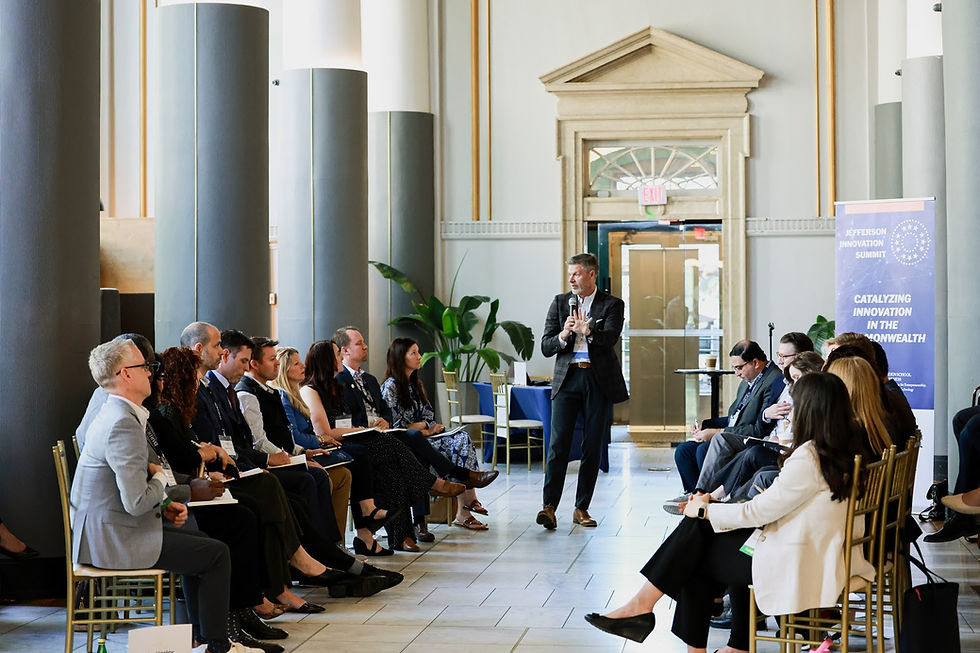Virtual Roundtable: Entrepreneurial Partnership as the First Step on the Road to Recovery
- Tom Tom Foundation Staff

- May 6, 2020
- 3 min read
Updated: Aug 25, 2020
How can collaboration uplift your city’s small business and startup landscape?
Communities from coast to coast are feeling the effects of COVID-19 in countless ways. At Tom Tom, we believe that there’s a more pressing need for connection and conversation among peer community leaders than ever before. What specific struggles are they facing? Which of their turn-on-a-dime efforts have been fruitful? And how do nonprofits, who rely heavily on fundraising to cover operating costs, survive with asks for support coming from all sectors?
Last week, our entrepreneurial roundtable brought together economic developers, accelerators, startup champions and more, who are working tirelessly to buoy their cities’ entrepreneurial ecosystems. See a few highlights from the discussion below.
If you’d like to join us for our next entrepreneurship roundtable, or a roundtable focusing on another theme related to innovation in America’s cities (economic development, education, justice, etc.), please reach out to ben@tomtomfoundation.org.
Meet the Justice Roundtable Participants:
Grace Belangia, Executive Director and Founding Member, the Clubhou.se (Augusta, GA)
Derrick Braziel, Cofounder and Managing Partner, MORTAR Cincinnati (Cincinnati, OH)
Erin Burcham, Director of Talent Solutions, Roanoke Regional Partnership (Roanoke, VA)
Ric Cavender, Executive Director, Charleston Main Streets (Charleston, WV)
Lindsey Cox, Program Manager and Policy Advisor, U.S. Department of Commerce – Office of Innovation & Entrepreneurship (Washington, DC)
Elizabeth Cromwell, President and Chief Executive Officer, Charlottesville Chamber of Commerce (Charlottesville, VA)
Enoch Elwell, Founder, CO.STARTERS (Chattanooga, TN)
Leah Fremouw, Vice President, Director of Marketing and Community Impact, Virginia Community Capital (Richmond, VA)
Kian Kamas, Chief of Economic Development, City of Tulsa – Office of the Mayor (Tulsa, OK)
Adam Klein, Chief Strategist, American Underground/Director of Strategy, Capitol Broadcasting Company (Durham, NC)
Jena Roscoe, First Senior Vice President, Chief of Government Affairs & Public Policy, Operation HOPE (Washington, DC)
Marcus Shaw, Executive Director, The Company Lab (Chattanooga, TN)
Sean Washington, Senior Business Development Manager, City of Norfolk (Norfolk, VA)
Cecilia Wessinger, Principal/Founder, Mass Collaboration (Tulsa, OK)
Tom Tom:
(Facilitator) Paul Beyer, Executive Director, Tom Tom Foundation (Charlottesville, VA)
(Facilitator) Ben Wilkes, Program Manager, Tom Tom Foundation (Charlottesville, VA)
Cecilia Wessinger, ESHIP Community Activator, Kauffman Foundation: We’re seeing that a lot of the communities that are doing really well in response brought together the existing systems that were in place.The communities that have the most connected ecosystem builders usually respond much better because they’re already connected and they’re already talking. There’s trust and collaboration already built in. They’re bringing their skill sets and knowledge and sharing it in a wider group. It wasn’t reinventing the wheel or training on a new skill, because we don’t have time to do that. Unfortunately, this won’t be the last disaster that we’ll have to address. We’re really going to have to get resilient about how we respond and come together.
Derrick Braziel, Managing Partner & Development Director, MORTAR: So the beautiful thing is that we have formed this beautiful consortium of partners and organizations that, in my experience, have never worked well together—that have never played in the sandbox very well together—but we’re working together really well now. We’re talking every week, we’re sharing resources, and I think it’s going to be really great. The challenge is we’re finding a lot of disinformation: people thinking that the PPP and other dollars will be enough to support our minority small businesses here. So we’re having to work against that, but I think we’ll get through it. Hopefully, by the end of this, we’ll have a fund that can support the needs of entrepreneurs here in Cincinnati.
Jena Roscoe, SVP of Government Affairs & Public Policy, Operation Hope: Black Enterprise magazine has done a really successful job of filling the gap in places, especially in the black communities where hand sanitizers and masks may not be plentiful. They highlighted seven black small businesses that create hand sanitizers, and within the last month, we’ve been sharing those resources with people. There’s even an African American bottled water company that has been doing aggressively well in neighborhoods and getting communities where they’re running out of bottled water, to be able to get that resource to people. So that’s one of the ways the collaboration has been helpful specifically: Hispanic and minority neighborhoods, where we’re located, were able to get local entrepreneurs to help bridge the gap with some resources.
A few resources gathered from this conversation:
Ecosystems Unite Facebook Page: Resources for Ecosystem Builders, Economic Developers, and Community Leaders (Thanks, Cecilia!)
Minority Business Emergency Assistance Fund: A collaborative effort put together to save a generation of small businesses in the Cincinnati, OH region (Thanks, Derrick!)
Financial Disaster Recovery Program: Operation HOPE’s national financial coaching network offers remote coaching services for individuals and businesses as well as opportunities to volunteer your time as a coach (Thanks, Jena!)




